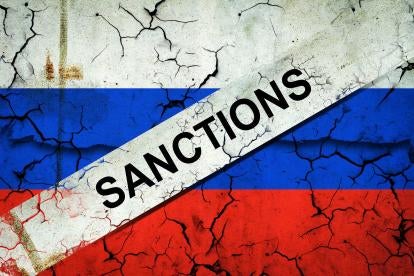The United Kingdom export control authorities continue escalating sanctions and export controls in relation to Russia and Belarus. We have summarised below the key points from some of the most recent developments and provided guidance on what actions firms should be taking in response.
RUSSIA SANCTIONS
Notice to Exporters: Trade Sanctions Circumvention
On 22 May 2023, the United Kingdom Export Control Joint Unit issued a notice to exporters (the Notice) aimed at preventing circumvention of Russia-related trade sanctions, export controls, and other restrictive measures, as well as increasing awareness of risks and obligations for traders dealing with sanctioned goods.
The Notice highlights that companies should carefully consider key risks when trading, in particular during their due diligence process. It states that a robust due diligence exercise together with continuous internal governance of sanctions are essential in order for companies to satisfy themselves that they are, and continue to be, sanctions-compliant. This due diligence should include companies identifying the true end-users of procured goods and closely scrutinising intermediaries or apparent end-users.
The Notice also identifies that due diligence should be repeatedly undertaken at appropriate intervals, even in relation to established counterparties, in order to capture any shifts in risk profile. For example, this could occur where there was a change of products traded or of directors in charge of the counterparty in question.
As a practical guidance for companies, the Notice provides a non-exhaustive list of key risk indicators, which could assist when assessing their risk exposure. The list is divided into three groups and covers customers, products, and countries.
These key risks include consideration of high-risk goods, high-risk destinations, parties with current or prior links to designated persons, the use of complicated corporate or deal structures (e.g., layered letters of credit), non-specific or misleading descriptions of goods, and a route of shipment or transactions inconsistent with normal geographic trade patterns.
Exporters should incorporate this guidance into their due diligence procedures to ensure compliance with current sanctions and conduct appropriate risk assessments where relevant. This may require the support of external advisers to test internal compliance and advise on the appropriateness of such processes.
Asset Freeze Licences
Since the Russian sanctions were introduced, the HM Treasury’s Office of Financial Sanctions Implementation (OFSI) has published a set of general licences (General Licences), which allow for otherwise prohibited activities to be completed, subject to various reporting and record-keeping requirements. This has included enabling some existing transactions involving designated entities and their subsidiaries to be completed or wound down within certain specified periods.
A new General Licence was implemented by OFSI on 22 May 2023, which allows a United Kingdom person to transfer to or receive funds from a designated person in satisfaction of a contractual obligation, provided that:
-
Such obligation arose before the date of designation;
-
Total value of the funds does not exceed £200,000, including value-added tax (VAT); and
-
No payments are made to another designated person, whether directly or indirectly.
While this General Licence has various other restrictions, for example, it does not apply to contractual obligations involving services being provided post-designation of the relevant party, it will hopefully be a welcome addition to the pre-existing list of General Licences. The key issue is whether this General Licence, and others already available, go far enough to enable those parties who have completed transactions that were not prohibited at the time of completion to recover payments for goods or services provided at the time.
One may wonder why, in such circumstances, the limit of £200,000 plus VAT has been included, given that on some levels it would appear contrary to allow designated persons to benefit from goods or services previously provided without paying for them just because the value was under a certain threshold. Would the United Kingdom government’s purpose not be better achieved by seeking to enable the payment of higher value amounts in order to deplete the moneys available to persons it has designated? This is an increasingly key issue in light of the ever-expanding designated persons list, which was recently updated with additional 86 individuals and entities, as discussed in our previous sanctions alert.
BELARUS SANCTIONS
In terms of sanctions targeting Belarus, the United Kingdom has recently introduced additional measures. The latest economic restrictions include:
-
Prohibiting the import of gold, cement, wood, and rubber to the United Kingdom from Belarus. The trade ban builds on pre-existing restrictions, which were put in place last July, banning the trade of goods worth around £60 million with Belarus. The targeted products included oil refining goods, technology, and luxury goods, as well as Belarusian steel and iron.
-
Restricting the export to Belarus of banknotes and machinery, as well as goods, technologies, and materials that could be used to produce chemical and biological weapons.
-
Restricting online activities aimed at preventing spread of propaganda in the United Kingdom. Social media companies and Internet service providers are required to block websites of designated Belarus media companies. This restriction follows the same approach as that previously taken in relation to similar designated Russian organisations.
-
The expansion of designation criteria for Belarus, which will enable the United Kingdom government to sanction a wider range of people, including close family members of already designated persons.
-
Further limits on Belarus’ access to United Kingdom financial markets, impeding Belarus’ ability to raise funds, and banning the import of goods that may have originated from Russia, such as gold. These restrictions are aimed at closing loopholes and addressing circumvention of United Kingdom sanctions, especially in light of the fact that the Russian and Belarusian economies are closely interlinked.
CONCLUSION
The United Kingdom continues to seek to tighten its grip on Russia and Belarus through the use of economic sanctions. How far the economic restrictions will continue to escalate remains to be seen; however, it is clear that the United Kingdom sanctions regime continues to develop, often in conjunction with the United States and European Union. Companies should carefully consider the increasingly complicated range of sanctions in place across the various sanctions regimes to ensure their compliance in day-to-day business decisions. This may require the support of specialist external advisers.





 i
i


